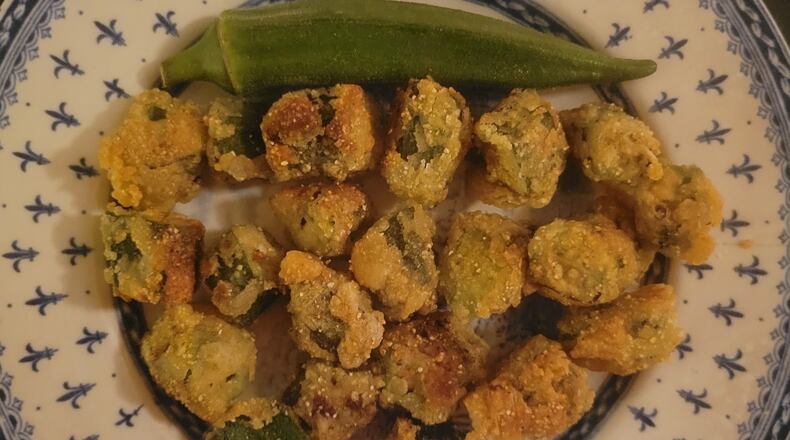Okra is now a key ingredient in gumbo, which is Louisiana’s official state food. The Low Country around Charleston also claims okra as a beloved vegetable. October 12 is National Gumbo Day.
The words “okra” and “gumbo” derive, at least in part, from languages belonging to the Benue-Congo branch of the Niger-Congo Language family. In fact, “gombo” is the word for the okra vegetable in several West African languages.
Although the words may be West African, the origin of okra is disputed. Long before it reached West Africa and then brought to the Americas, it may have actually originated in South Asia and migrated west to Africa. India actually accounts for nearly two-thirds of the world’s okra production, and okra is an ingredient in a number of Indian dishes.
Okra is a fruit botanically related to cotton and cacao. It is oddly shaped, an elongated 5-sided pod with prickly skin, with lots of seeds and gel inside.
“Okra’s a strange little vegetable, the kind of thing you might not guess was edible if no one told you,” writes Smithsonian Magazine.
Okra pods contain tiny white seeds that are slimy and sticky. This gooey quality is a helpful thickener in gumbo and other stews simmered slowly over low heat. But when it is cooked long and slow, okra can retain a strong flavor and a slimy texture that can be off-putting.
For me, the most appealing way to cook okra is crispy fried. Slice the okra into 1/4 inch pieces, trim and discard the stem ends, and pat the pieces dry.
Prepare three bowls, one each with flour, a beaten egg, and cornmeal. Dredge the okra pieces in flour, then egg, then cornmeal, and fry in grapeseed oil until golden brown. Remove the okra and drain on paper.
Okra carries a complex message. Is it a shameful reminder of enslavement that once flourished in the Deep South? Or is it a proud symbol of cultural identity for the descendants of enslaved people?
Okra’s evocative cultural history has generated more than its fair share of poems and songs. For example, Roy Blount Junior’s “Song to Okra:” Oh wow okra, yessiree/Okra is Okay with me.
And January Gill O’Neil’s poem “In Praise of Okra:” No one believes in you like I do./I sit you down on the table & they overlook you.
Pierre Thiam, author of “Simply West African,” told Food & Wine “Okra is spiritual, and that’s why it’s not for everyone.”
MOON Co-op Natural Foods & Deli is Oxford’s consumer-owned full-service grocery featuring natural, local, organic, sustainable, and Earth-friendly products. The store, located at 516 S. Locust St. in Oxford, is open to the public every day. Check it out online at mooncoop.coop.
About the Author
